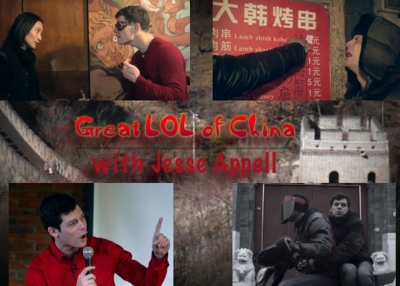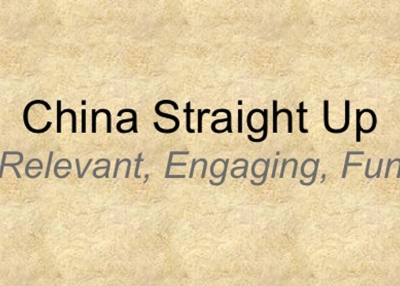Episode 7: Chinese Slang Game Show
Each episode is accompanied by a blog post which examines various elements mentioned in the video at a deeper level and draws connections to the world we live in today. The following blog post is by Kiril Bolotnikov, student at New York University Shanghai.
In my six years of studying Chinese, rarely has there been an opportunity in the classroom to learn anything but rote phrases and vocabulary that was often too formal or even outdated. It is worth keeping in mind that Chinese, like any other language, is evolving quickly and constantly—and even more quickly now with the influence of the Internet. Furthermore, consider the drastic differences in language between the American South and New England: certain turns of phrase and colloquialisms, or “slang”, are very prominent in one area and unheard of in another, though there is of course some overlap. It is exactly the same in China; slang in Beijing is different from slang on the southern shores is different from slang in the west of the country, especially if you take into account the drastic differences between dialects around the country that are often mutually unintelligible.
I was curious to know more about Chinese slang, so I asked my schoolmates at New York University Shanghai to suggest some for my edification and for the purpose of this article. In this, part one of two, I have included some of the (non-profane) ones that have to do with dating and romance, and also tried to give a sense of some stereotypes of modern Chinese youth. There are two parts to this blog post; the following is part one. For part two, click here.
***
“The thing is, every time you translate slang, you wind up with two translations: one is the slang translation, the other is what the words in the original phrase actually meant.”
Each term below is accompanied by literal and more accurate translations.
绿茶妹 (Lǜchá mèi)
- Literal translation: “green tea girl”. The term “green tea” is used because the girls’ exterior attitude and appearance is like that of the traditional tea, which is light in flavor and used to calm nerves. Green tea has been connected with poetry, art, purity, and respectability for a very long time. The Chinese vision of a girl who is 绿茶 means a long-haired, beautiful girl with a demure and refined exterior, presenting themselves without artifice, apparently pitifully cute—however on the inside they are scheming and shrewdly ambitious, worshipful of money, and willing to “sell out” their physical bodies if it helps them achieve their goals.
- 绿茶妹 is actually a more polite way of saying 绿茶婊 (Lǜchá biǎo), which translates literally to “green tea prostitute.” The term gained popularity after a well-known party in 2013 called the Hainan Rendezvous, which was known for its wealth, excess, and guest list of the rich and famous, was accused of actually being a sex party where female models and even some celebrities would sell themselves.
- 绿茶婊 could probably be colloquially translated as “gold digger.” This reveals a cultural opposition to what some see as overly materialistic trends emerging in modern China.
白富美/高富帅 (Bái fù měi / gāo fù shuài)
- These two are very common. In popular culture, these are seen as the most desirable traits in a girlfriend or boyfriend. One internet user described these two figures as “top-notch” and “the opposite of 屌丝 (diǎosī),” which is the word Jesse used to describe a loser. These terms also point to the growing materialism in modern China and reactions of the youth.
- 白富美, character by character, means “white rich beautiful”, and is used to describe women who have these qualities. “White” or un-tanned skin became a desirable trait originally because of the perception that someone who has pale, un-tanned skin does not have to be outside at all, indicating wealth. Nowadays, however, white is seen as a general sign of beauty and not just a sign of wealth. Women with sun umbrellas are a common sight, as are women with very white skin or at least very white makeup. Many skin creams in China, regardless of whether they are for whitening, contain whitening cream.
- The male equivalent is 高富帅, which character by character means “tall rich handsome.” The concept of 富 is especially important for men, as it is difficult for them to seek a marriage unless they have an apartment, a car, and a solid income (有车有房). Many men are unable to marry for this reason, especially since there are many fewer women than men in China.
- The literal opposite of 高富帅,an undesirable boyfriend, is 矮丑穷, or “short ugly poor.”
土豪 (Tǔháo)
- Another term that deals with China’s new-found wealth, 土 means “earth,” and 豪 translates to something like “bully.” It refers to those who became wealthy after the economic reforms, and especially their children. They are seen sort of as wealthy bumpkins, like a Chinese version of the “Beverly Hillbillies.” They spend enormous amounts of money and enjoy showing off their wealth; however, they are perceived to be rather tasteless. Though this is the original meaning, I have heard it used to refer to any of the “nouveau riche,” regardless of location or taste.
文艺青年 (Wényì qīngnián)
- In contrast, those that have less material or pragmatic priorities are looked down upon. Literal translation: “literature and art youth.” It is used broadly to refer to anyone interested in art and literature, but also more specifically to refer to a certain brand of youth that are educated in literature and the arts, often watch a lot of movies and listen to a lot of music, but are unable to earn money and have no social skills. They possess stubbornness about achieving their unrealistic, impractical dreams and are as such perceived as imbecilic.
Below is a visual depiction that should give you a sense of where the 4 different groups of people (高富帅, 土豪, 文艺青年, 屌丝) mentioned above fall in society as determined by two simple factors: wealth and education.

吃豆腐 (Chī dòufu)
- Literal translation: “to eat tofu,” but saying that someone is “eating tofu” generally means they are taking advantage of someone, often with a sexual implication. Baidu Baike claims that it arose from an old joke about those who wanted to fill their bellies by frequently paying their condolences at funerals and eating the food that had been prepared for guests. Another origin story is that a woman who sold tofu would flirt with her customers and allow them to grope her, making jealous wives ask, “oh, you want to go eat tofu again?” The phrase is usually used somewhat jokingly, as friends might say to each other 不要吃我豆腐, “don’t eat my tofu!”
吃醋 (Chīcù)
- Literal translation: “to eat vinegar.” However, saying that someone is “eating vinegar” means that they are jealous about something. It is a very old term, alluded to a classical story of the Tang Dynasty. Taizong, the second emperor, wanted to win over the people by having his minister take a concubine from amongst them, but the minister’s wife was jealous and would not allow it. The king had no choice but to order the minister’s wife to either drink poisoned wine and die, or allow her husband to take a concubine. To his surprise, she agreed that she would rather die than bow to the king’s will, and drained the cup in one go; to her surprise, however, the cup was full of sweet-and-sour concentrated vinegar, and not poisoned wine.
小鲜肉 (Xiǎo xiān ròu)
- Literal translation: “fresh meat,” and is used similarly to the way we use it in English. However, it refers specifically to good-looking young men and women (between 12 and 25 years of age) who have a mild temperament and little to no romantic or relationship experience. Many are looking for this kind of partner.
么么哒 (Me me dā)
- Onomatopoetic sound of kisses. Basically, kissy noises. 么么哒 can be added at the end of a sentence to convey cuteness, and it is often used freely in texting.
***
I hope that you found this post valuable and informative, and that you now have a deeper understanding of Chinese slang! Slang in any language is innumerable and endlessly various, and China has a fascinating mix of slang due to the convergent influences of the Internet, words from other languages, the use of homonyms, and much much more. The list above is by no means comprehensive, but I discovered a lot in my research and I hope it is interesting to you as well, whether you are here to spice up your vocabulary or simply try to understand something about Chinese colloquialisms. If you are interested in stocking up on your slang vocabulary, click here for Part Two of this blog post.
Please share this article with anyone who you think would find it interesting: friends, family, teachers, students! More posts are forthcoming as we dive deeper into the immensity and many complexities of China.
Asia Society and the China Learning Initiatives appreciate your interest in learning more about China. If there are any topics you want to learn more about, feel free to email us at [email protected].


